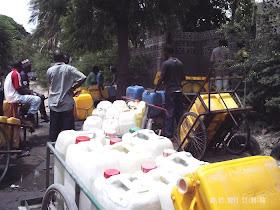But freshwater especially human beings. , without a doubt, is the most valuable resource for all living organisms in Tanzania – The fresh water is mostly available in some Urban areas, Instade of Rural areas. About 85% of the local population acquires its water through the Modern water sewage facilities.
At a other women dressed up in colorful cloths called ''Kanga'' or vitenge in Swahili are seen along water system in pairs frequently along the streets in the peri-urban areas. The maids and women carry equally colourful twenty litre plastic buckets on their heads. The buckets contain water to drink in the wake of acute water shortages in the areas. It means that water quantity for bathing is more limited since it is of less importance compared to drinking and cooking.
As a result, people have to find alternative to bathing in order to ensure that they do not produce foul smell especially where the means of transport is the City buses in which passengers are crowded. Bus conductors instruct students to sit on each others' laps in order to fill up every inch of the space in the buses.
People waiting for water in one of the drainage system, Its take a long time to get it
for there daily consumption
Women do most of the work, and there is not enough water. Here, the
girls return from the community tap with water for
the evening, after finishing class for the day
Relative to other African countries, ................ Morogoro Urban Water Supply Authority, while 10% fetch water directly from steams and local wells, and a final 5% have independent means for acquiring water. Most of these sources provide potable water, although in recent years there have been outbreaks of water resource, also known as snail fever, due to an abundance of stagnant freshwater in some places. There is a need to strike balance between the demand for freshwater in the region, and the amount that can be sustainably supplied by regional sources.
In Tanzania today, the water situation is not fixed nor nearly perfect, but the government and the people know how important it is to have access to sanitary options and continue to work towards that goal.
While Tanzanians look up to the government to provide solutions to their water problems, they too have a role to play in protecting water sources because water is life. The government should also plan for realistic theme that meets the needs at the moment; as the theme given this year is ideal for ensuring availability of clean and safe water neither to cities (urban areas) nor the marginalized rural areas.
20,000 children die before the age of five each year in Tanzania due to diarrhoeal diseases.

“The average woman in Tanzania will walk three hours a
for just 40 liters of water. When women and children are doing these
walks, they’re not in school, they’re not running businesses, and
they’re not teaching their children,
Source: WV Outpost (http://s.tt/1cqVM)
“The average woman in Tanzania will walk three hours a
for just 40 liters of water. When women and children are doing these
walks, they’re not in school, they’re not running businesses, and
they’re not teaching their children,
Source: WV Outpost (http://s.tt/1cqVM)
“The average woman in Tanzania will walk three hours a
for just 40 liters of water. When women and children are doing these
walks, they’re not in school, they’re not running businesses, and
they’re not teaching their children,
Source: WV Outpost (http://s.tt/1cqVM)
“The average woman in Tanzania will walk three hours a
for just 40 liters of water. When women and children are doing these
walks, they’re not in school, they’re not running businesses, and
they’re not teaching their children,
Source: WV Outpost (http://s.tt/1cqVM)
“The average woman in Tanzania will walk three hours a
for just 40 liters of water. When women and children are doing these
walks, they’re not in school, they’re not running businesses, and
they’re not teaching their children,
Source: WV Outpost (http://s.tt/1cqVM)
“The average woman in Tanzania will walk three hours a
for just 40 liters of water. When women and children are doing these
walks, they’re not in school, they’re not running businesses, and
they’re not teaching their children,
Source: WV Outpost (http://s.tt/1cqVM)






No comments:
Post a Comment